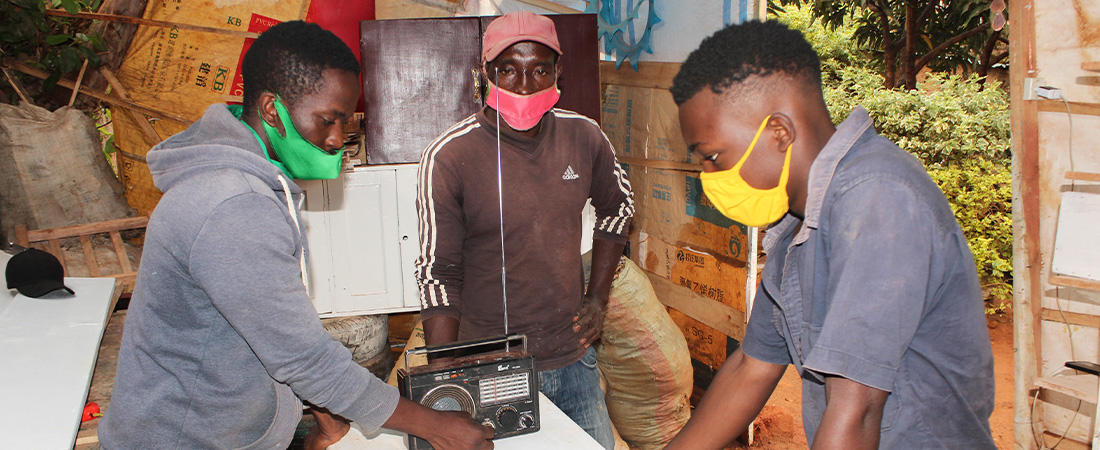Delivering Work Readiness Skills via Mobile Phone

Celestin Nshimiyimana used to attend trainings from EDC’s USAID-funded Huguka Dukore Akazi Kanoze (HDAK) project in person. Now, in an age of coronavirus restrictions, he tunes into an audio broadcast from the project instead.
“I listen to the audios every time I receive a [notification on my phone],” says Nshimiyimana, an HDAK participant from the northern part of Rwanda. “I like the way everything is framed in our daily life experience.”
Since 2016, HDAK has been helping young Rwandans learn how to build the skills and attitudes they need for success in Rwanda’s changing economy. But when the government of Rwanda declared a total lockdown due to the coronavirus pandemic in March, project staff had to find other ways to deliver lessons on leadership, entrepreneurship, and financial literacy to youth such as Nshimiyimana.
The answer? Record, edit, and deliver audio programs to HDAK youth via their mobile phones and over the radio.
The programs are all between 10 and 15 minutes long and employ a serial, narrative format. Through meeting fictional characters who discuss their day-to-day experiences as employees and entrepreneurs, youth enrolled in HDAK learn valuable skills about how to negotiate conflicts, how to communicate with peers and customers, and how to build their own small businesses—all core topics in the face-to-face trainings.
The audio programs were based on a similar set of recordings used in Liberia in 2016. HDAK staff re-recorded portions of those programs to better reflect the topics that the program had been covering in the face-to-face trainings before the pandemic. They also created new characters to better reflect the Rwandan context. The programs were largely recorded and edited in the homes of HDAK staff, since they were all following quarantine protocols as well.
Sending content to youth’s mobile phones has been an effective way to deliver content, according to EDC’s Steve Kamanzi, chief of party of HDAK.
“We have an assurance of reaching the right beneficiaries of our project,” Kamanzi says.
In all, the team has created 42 episodes since March and has been delivering two episodes a week to more than 2,000 youth participating in HDAK. In addition, the lessons are now being broadcast over 1 Radio, the country’s main radio station, as part of a popular existing youth radio program. To boost listenership, HDAK reminds youth to listen via text messages sent before the program airs, and then asks them for feedback on the ideas presented.
Youth are tuning in—and responding—with 314 youth sending messages to HDAK during the first six weeks of the radio broadcast.
“I liked the audio messages, especially one actor called Silas who encouraged me to keep being loyal to my employer,” says Francine Iribori, one of the young people participating in HDAK. “I learned that being honest makes people believe in you and can help you stick to your job.”
Kamanzi enjoys hearing that feedback.
“We believe there are thousands of youth, just like Francine, who are being positively impacted by the radio program,” Kamanzi says.